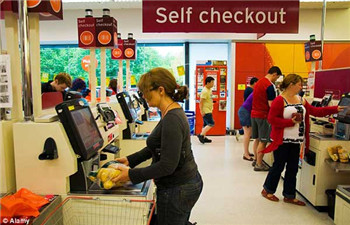(单词翻译:单击)

It can be one of the most frustrating things in life – waiting in line at the supermarket.
在超市排队结账确是一件很让人懊恼崩溃的事儿。
But new research shows that a few simple 'life hacks' can make the process much quicker and pain-free than you may think.
但新调查研究表明,几个简单的生活小技巧可帮助我们加快结账排队速度,且并没有我们想象中那么复杂麻烦。
Choosing to be served by female cashiers, standing in queues that feed into several tills and spying on other shoppers' grocery shop are just some of the ways to avoid the dreaded queues.
选女收银员结账的,排有若干个收款台的队伍,“偷瞄”其他顾客所买的杂货都能让我们避免那令人抓狂的长队。
And opting for checkouts on the left or queuing behind shoppers with a trolley could also help cut down the amount of time waiting in line.
此外,选择左手边结账口或排在推着购物车的顾客后面也能减少队伍等待时间。
The 'life hacks' have emerged after researchers found that the average Briton spends between one and six months of their life standing in line at the shops.
生活小妙招的出现源于研究人员发现英国人一生平均要花费一到六个月时间在商店排队等候。
Desmos, a US organisation that promotes maths, technology and data, has spent months analysing supermarket data and has revealed the best ways to beat the queues.
一家专业研究数字、技术和数据的美国机构Desmos花费了数个月时间对超市数据进行了分析,并提出了不用长时间排队等候的最佳方式。
Dan Meyer, a former maths teacher turned chief academic officer at Desmos, said it takes a baseline of 41 seconds for each customer to pass through a till, with an additional three seconds added on per item they are purchasing.
达恩•迈尔表示每名顾客通过收银台平均要用41秒,购买的物品每件再额外增加3秒。达恩•迈尔之前为一名数学老师,后成为Desmos首席学术官。
'Every person requires a fixed amount of time to say hello, pay, say goodbye and clear out of the lane,' he told the New York Times.
他对《纽约时报》表示:“每个人说你好、支付多少钱、再见以及结完账腾出空位的时间都是固定不变的。”
He said the data showed that standing in line with numerous customers who are buying fewer items – such as basket shoppers at the '10 items or less' checkout – can be a bad choice. Instead, he says it actually works out quicker to stand behind one person with a trolley full of items, as the face-to-face interaction time is quicker than having to wait for the cashier to greet numerous shoppers.
他说,数据显示排在很多购物少的顾客后面——比如在“10件或少于10件”结账口使用购物篮的顾客,会是很糟糕的决定。相反,站在一个购物车满满当当的顾客后面速度会更快,因为和等待收银员一个个问候顾客相比,面对面交流时间减少能够加快排队速度。
Meanwhile, Robert Samuel, founder of the New York-based Same Ole Line Dudes – a service that stands in line on behalf of customers - said most people are right-handed and therefore tend to queue on the right-hand side. He advises customers to queue on the left, and said he opts for female cashiers.
同时,纽约Same Ole Line Dudes公司(一家专门代客排队的服务机构)创始人罗伯特•塞缪尔称大多数人是右撇子,故多倾向于站在右边队伍排队。他建议顾客站在左边,还说他会选择女性收银员。
'This may seem sexist, but I prefer female cashiers. In my experience they seem to be the most expedient at register transactions and processing,' he told the newspaper.
他还告诉《纽约时报》:“虽然这似乎有点性别歧视,但我确实更倾向于选女收银员。根据我的亲身体验,女收银员在结账交易处理上更快捷利索。”
His other advice includes always facing bar codes toward the cashier, removing the hangers of clothes before they are scanned and splitting the items between yourself and a friend to get through the tills quicker.
他还提出了一些其它建议,比如将商品条形码正对收银员,在收银员扫码前把衣服上的衣架摘去,将自己和朋友买的东西分开来,这些都能加快结账速度。
Around three-quarters said seeing staff not serving customers when there was clearly a long queue was their top gripe.
约四分之三的人称最让他们崩溃的是明明大家排了很长的队伍,但收银员却不给顾客结账。
This was followed by shoppers who skip the queue (72 percent), queues without a clear system (66 percent), people who slow a queue down (46 percent) and staff not apologizing for a long queue.
其次是插队现象(72%的人受不了),结账队伍混乱不清(66%的人受不了),某些人降低排队速度(46%的人受不了)以及大家长时间排队工作人员却不主动道歉。


